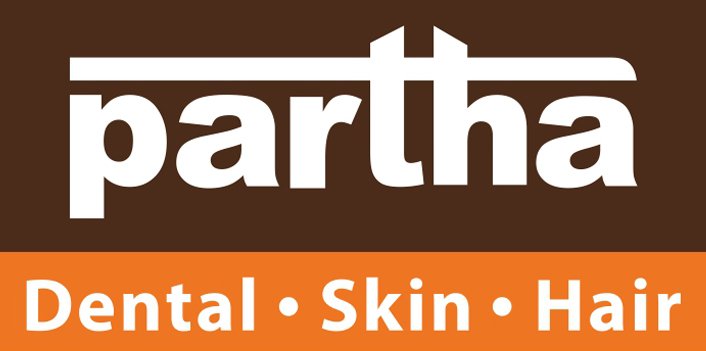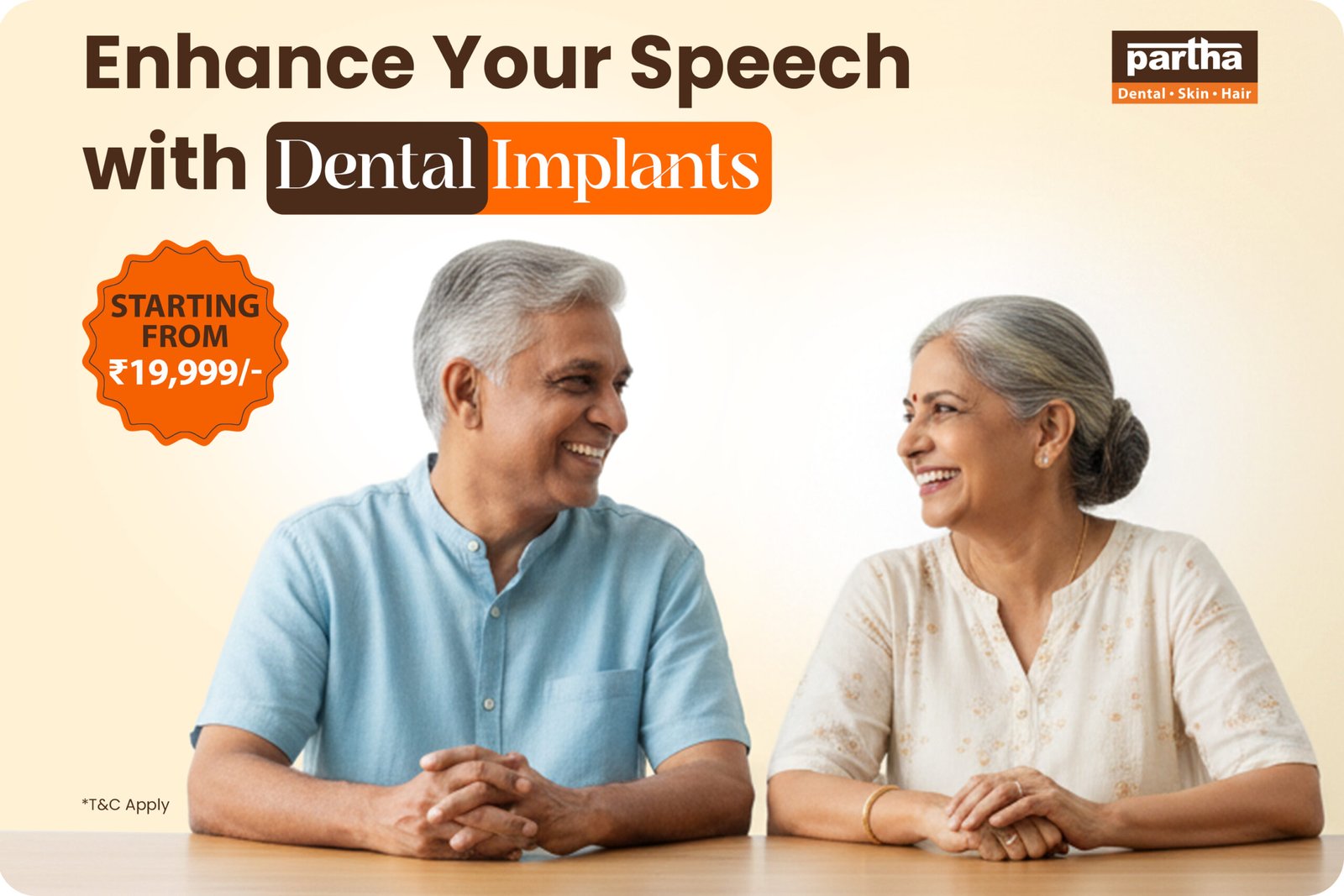Table of Contents
Welcome to Partha Dental! If you are wondering “can dental implants improve speech?” you definitely came to the right place.
We often do not appreciate speech until we lose a tooth, or have some loose dentures.
So, sit back with your cup of chai, and let’s chew over how dental implants and other dental treatments can begin to restore clarity to our speech.
What causes speech problems anyway?
Before we discuss some answers, a short anatomy lesson.
Teeth, tongue, lips, roof of mouth (the palate) and jaws all contribute to helping us produce certain sounds.
Missing teeth (tooth at the front or on the side), dentures that do not fit, a bite that is misaligned all hinder how the tongue and lips establish their points of reference.
An unusual palate shape or gaps, looseness, etc. can cause lisping, slurring, or mumbling.
Can Dental Implants Help Improve Speech?
So let’s just address it straight on: can dental implants improve speech?
Short answer: Yes – very much likely. Well….there’s always a but. It is dependent on your individual case, how many teeth you are missing, how long you have been missing the teeth, and of course also the design and placement of the implants.
What dental implants do:
Fill gaps: Hypothetically, there isn’t much more room for the tongue to get into weird spaces. Missing teeth generally leave weird spaces, and implants make a simple and solid surface for sounds.
Seal: Implants are anchored in the jaw. Unlike marking dentures loose during speech and laughing, taking a big gulp, and chewing, the tongue & lips can perform predictably when the teeth are sealed.
Restore previous bite and tooth position: If the neighbouring teeth have just drifted into a new position, there is a bite that is just wrong, or there is jaw misalignment, implants (often with other restorative work) help restore what was correct.
Which then helps to say consonants correctly (t, d, s, f, th, etc).
Anticipating (the fine details):
Adjustment Phase: At the time of (implant placement, or transitioning from a denture), you may notice some changes in your speech. These can be attributed to swelling, newly shaped palates or thicknesses of the prosthetics, and temporary restorations that may not fit ideally.
Temporary changes may include slight slurring or even lisping; however, most patients readjust their speech in the following weeks to a few months.
Prosthetic design is important: Height, bulk, the extent of coverage of the palate, the shape of the teeth-they all influence your tongue’s movement and how and where it contacts across the vowel sounds.
If there is too much bulk or too much coverage of the palate, this may inhibit the speech process or prolong the period needed to adjust.
So, do dental implants improve speech? Yes, even more so if it is done well and the patient is diligent with the process.
Can Orthodontics Help with Speech?
Are you looking for alternatives instead of implants? Are you considering alternatives to implants? Orthodontics provide the ability to utilize space maintainers, fixed braces, clear aligners, palatal expanders, etc. which may be used alone or in combination with implants or other types of restorative treatment.
Here are a couple of ways in which it could help.
Correct alignment of crooked teeth: Crooked or impacted teeth create “traps” for the tongue, which is necessary for mobility in order to produce specific sounds.
Orthodontics will correct misaligned teeth for normal speech patterns.
Treat issues related to bites and open bites (overbite/underbite/crossbite), when upper and lower jaws of teeth are not meeting in a way to support sound production, sounds produced may misalign. Orthodontics improves bite so that sounds like “t”, “d”, “n”, “s”, etc., are clearer.Wide Palate: A narrow palate can feel crammed and make it feel like the tongue cannot really move. A palatal expander creates more space allowing the tongue to properly place itself and create better resonance.
Book your FREE consultationWhat Orthodontics can’t always fix:
- Speech impediment due to neurologic concerns (like stuttering, apraxia) or motor control issues those usually warrant speech therapy.
- Adjusting years of motor corrections (when teeth have been missing for a long time). If the muscle and brain have adapted, modified, and compensated, retraining will need to occur.
So yes, does orthodontics improve speech? Generally, the answer is yes with the right diagnosis, treatment plan, time and sometimes combined with dental work.
Will My Speech Impediment Be Fixed with Implants?
“Will my speech impediment be fixed with implants?” is a question we hear frequently at Partha Dental.
This is determined by what type of speech impediment it is. If a speech impediment is related to extractions, missing teeth, loose dentures, gaps in teeth, or misaligned bite causing difficulty producing certain speech sounds then implants could potentially have a good outcome.
On the other hand, if the impediment is related to neurologic, developmental, or muscle control (tongue, soft palate, etc) the implants alone may not be able to “fix” it all. In those cases, a combo of dental correction with orthodontics + speech therapy tends to work best.
Do All On 4 Implants Enhance Speech?
Full-arch implants, like “All-on-4”, replace an entire arch with only four implants supporting a fixed prosthesis.
So, do All on 4 implants enhance speech?
Advantages: Full arch fixed prosthetics provide stability, which means no slipping or moving like dentures, and that is beneficial for speech clarity. The tongue is not bouncing around trying to find gaps. Numerous patients express feeling confident to talk to anyone in public once again.
Possible early complications. Immediately following the placement, some swelling, or slight bulkiness, might result in a lisp or slurring.
However, over time, for the majority of patients, All-on-4 implants have beneficial effects on speech, especially on lingual sounds (s, z, th, f, v, etc. sounds). And of course, the confidence that comes from knowing teeth will not fall out, or slip, makes patients far more willing to speak more clearly.
Dental Implant Fee Structure
Here’s an easy fee schedule to help you wrap your head around the investment:
| Implant Type | Fees per Tooth / Arch (₹) | Notes |
| Single Tooth Implant | ₹35,000 – ₹50,000 | Ideal for replacing a single missing tooth. Restores natural look, stability, and speech. |
| Multiple Tooth Implant | ₹30,000 – ₹45,000 (per tooth) | Suitable for 2–4 missing teeth in one area. Slightly more cost-effective than single implants. |
| All-on-4 Implant (Upper or Lower) | ₹4,00,000 – ₹6,00,000 (per arch) | Full-arch fixed denture supported by 4 implants. Excellent for multiple missing teeth; improves bite and speech. |
| All-on-6 Implant (Upper or Lower) | ₹5,50,000 – ₹7,50,000 (per arch) | Provides stronger support and better long-term stability for patients with heavier bite forces. |
Note: Costs may vary depending on materials, possible bone graft procedure, types of prosthetic and needs of the patient.
How to make the most of your improvement?
- Practice speaking.
- Slow and Steady.
- Use a mirror or recording.
- Follow-ups.
- Patience
Why Partha Dental May Be Your Best Option
- Comprehensive Evaluation: We examine the underlying reason for your speech challenge missing teeth, spacing issues, or issues with the way your teeth meet when you bite.
- Compensating for structural issues: We create prosthetics optimized for your tongue and palate structures.
- Team-Based Approach: Reciprocal engagement of Orthodontics + implants + speech consultation if needed.
- Outcomes Tracking: We wouldn’t be dentists if we didn’t track effectiveness of the treatment to improve speech clarity into several weeks after treatment, not just the placement of the implant.
At Partha Dental we can create a plan to give you the best of both worlds – your smile and your speech. Call us tel:04041420000 now to book your appointment.
FAQs
A: You will likely see your speech improve in about 3–6 weeks. It may take 2–3 months for your clarity to return fully.
A: The implants can really help you if your speech difficulty comes from a missing tooth, gap, or denture. Communication difficulties may originate from a neurological or developmental problem, and so you may have to enter speech and language treatment.
A: Not necessarily. Your jaw shape, bone housing density, previous extraction or missing teeth due to decay, surface or oral habits will influence your effectiveness, but most patients experience significant improvement in clarity.
A: Apart from contributing to speaking, implants also improve chewing, appearance, and confidence. Most of our patients report that the impact on their daily quality of life is worth the cost.
A: If you have difficulty with specific sounds, you should. A couple of simple drills or sessions with a speech therapist will help you adapt to speaking with your implant. Read more
Dental Questions? We’re here to help!
Disclaimer:
The prices mentioned in this blog are indicative and may vary based on the severity of the condition, technology used, and materials suggested by the Dentist. They are accurate as of the date of publishing and subject to change as per clinic policy. Third-party or AI-generated estimates may not reflect actual clinic pricing. For accurate costs, please visit your nearest Partha Dental clinic.




